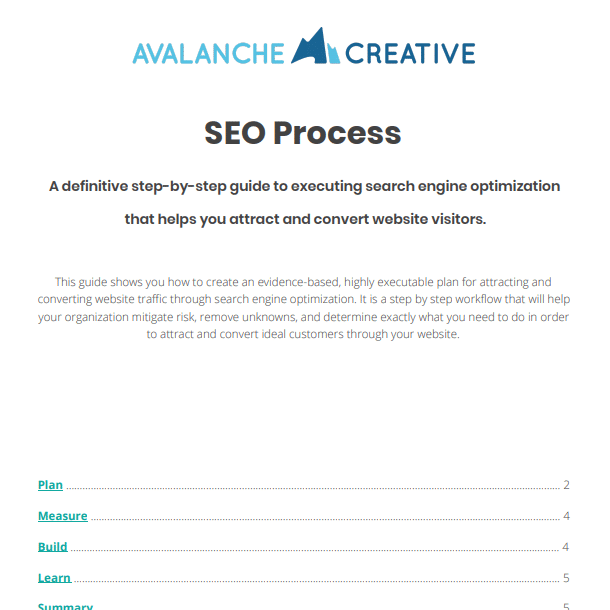Multi-location SEO Strategies
If your business offers local services in several cities, regions, or states, a strong SEO strategy for multiple locations can significantly boost your business. It allows your website to bring in leads from people in your coverage area who are already looking for the type of services you offer.
Avalanche Creative has worked with many companies that offer their services nationwide, and we’ve built multi-location strategies that target individual states and cities.
Who Needs Local SEO for Multiple Locations?
Business with multiple branches or services areas can benefit from running a local SEO strategy for each area. This includes nationwide companies that have in-person services.
- Landscapers
- Construction companies
- Roofers
- Healthcare and hospital networks
- Chain restaurants
- Real estate companies
- Security agencies
- Business directories
Will I Need Multiple SEO Campaigns?
While you’ll need to target your SEO for multiple cities and regions, your campaigns don’t necessarily need to be completely different. You can use many of the same keywords and strategies for each location with minor tweaks. If there is keyword volume for “roof repair in Lansing,” there’s a good chance that there will also be keyword volume for “roof repair in Grand Rapids.”
Since most visitors to your website will only see the service page for their area, many of the elements of the pages can be shared across each page. This makes building the pages more efficient. But you should avoid having too much exact information across multiple pages of your site.
How to Build a Local SEO Strategy for Multiple Locations
Use a Multi-location Website Design
One of the first steps in designing a multi-location SEO strategy is to make sure your website is optimized for it. You should have a page on your site dedicated to housing the service pages for each location. That page should be easily accessible from the home page, such as in a menu tab at the top. In addition, you can create a drop-down menu that links to each of your service pages.
Build Multiple Service Pages
In order to target all the locations you serve, you’ll need to have a service page for each of them. Which service pages you create should be determined by a combination of your business goals and SEO research.
For instance, let’s say you provide plumbing services in Indianapolis and are looking to expand your coverage area or increase your current number of leads. “Indiana plumber” doesn’t have any SEO volume, but “Indianapolis plumbers” has 1,000 searches per month. That’s a great start, but if you stop there, you’d be missing out on hundreds of other searches in your service area.
Indianapolis suburbs such as Greenwood, Whiteland, and Zionsville each have more than 100 searches for plumbing services each month. Adding service pages for individual towns in the Greater Indianapolis area can nearly double your SEO reach in the region.
Identify Local SEO Keywords
Once you’ve identified the areas that you’d like to target with local SEO, you’ll need to find the keywords (search) terms that Google will recognize as seeking a local result.
“Plumber Indianapolis” isn’t the only keyword that people in that city will be using. “Plumber near me” receives more than 300,000 searches per month across the United States. Most of those searches aren’t in Indianapolis, but there are likely enough searches in the area to also target that term. But there are so many more opportunities, including:
- plumbing supply indianapolis — 720
- plumbing indianapolis — 260
- best plumbers indianapolis — 140
- emergency plumber indianapolis — 110
- plumbing companies in indianapolis — 110
- 24-hour plumber indianapolis — 90
Each of these search terms presents an opportunity to create service pages and blog posts that will reach hundreds more potential customers. Once you start conducting keyword research like this for every region that your businesses serves, the opportunities really start to stack up.
Create Content with SEO Geo-Targeting
After you’ve identified your local keywords, it’s time to start building content around them. In addition to service pages for each location, you can also create blog posts that target different local topics. Let’s imagine you’re running a bookstore in Seattle. There are plenty of local SEO keywords to target with pages and blog posts on your website.
- seattle book clubs: Write a post talking about the opportunities for book clubs to meet at your shop, and highlight some of the clubs that do. Talk about a few of the most popular Seattle clubs and promote discounts for book club books.
- seattle book festival & seattle book fair: Highlight book fairs and festivals in the area and focus on ones that are hosted by or sponsored by your store. Talk about the types of books that are at those fairs and the similar inventory available at your shop.
- used books seattle & selling books seattle: These pages can describe the type of books that you purchase and resell, the process of selling used books, and their potential prices.
- comic book store seattle: Create a page highlighting the comics and manga at your store. Discuss used comics and mention any clubs or gatherings around comics at the store.
Utilize Google Business
Building and optimizing your Google Business Profile is crucial to getting your location pages ranking at the top of the search results page (SERP) and featured in Google’s local pack. The local pack is a collection of businesses that are collected at the top of the SERP when someone uses a local keyword or searches for a service that is typically localized.
One of the best ways to boost the click-through rate of your Google Business Profile is to show off a bunch of great reviews of your business. Customers are more likely to visit your website if you have a five-star rating than a two- or three-star rating.
There are several ways to ask your customers for reviews, including through emails, text messages, in-person conversations, and on your website. Once you receive reviews, it’s a good idea to respond to them on the Google Business Profile to show that your business cares about its customers and their feedback.
Start Building Your Multi-Location SEO Strategy
Ready to start building a multi-location strategy for your business? Schedule a quick call with our team to learn how Avalanche can help you get more qualified leads.
Share this article:
The Avalanche Email: Fun. Simple. Educational. No Selling.
Learn Result-focused SEO & Content
Join over 2,272+ others who get one email every Wednesday with simple instructions on how to get more website traffic and leads through SEO and content marketing. (Learn more about the email)
Keep Learning
Creating the Perfect SEO Content Template in Google Docs
Learn how to create an SEO Content Templates in Google Docs to help drive new traffic to your website from the search engines. SEO Content Templates provide specific recommendations and directives for creating new content on your website with the purpose of improving your SEO.
How To Show Up in Gemini (And Win More Local Jobs)
Show up in Gemini when homeowners search for landscaping services. Build the right signals on Google and your website to win more qualified local jobs.
How to Run Google Ads for Landscapers: A Complete Guide
Learn how to set up Google Ads for landscapers, attract qualified leads, and win more local jobs with this step-by-step guide.
🏔️ Watering > Planting New Seeds
Your next marketing win may already be on your site. Learn how to optimize existing pages for better rankings, traffic, and results.
The Recipe vs. The Meal
Your customers buy the experience, not the product. Discover a simple way to shift your message from ingredients to the full meal.
What’s the Best CMS for Landscaping Businesses?
Compare the best website platforms for landscapers. Learn the pros and cons of Wix, Squarespace, and WordPress, and why WordPress is best for long-term SEO.




